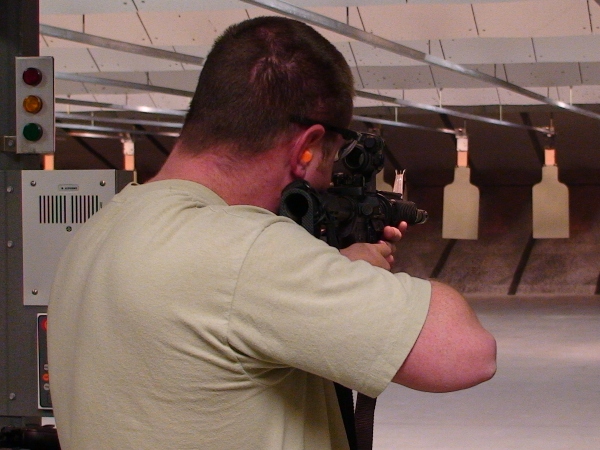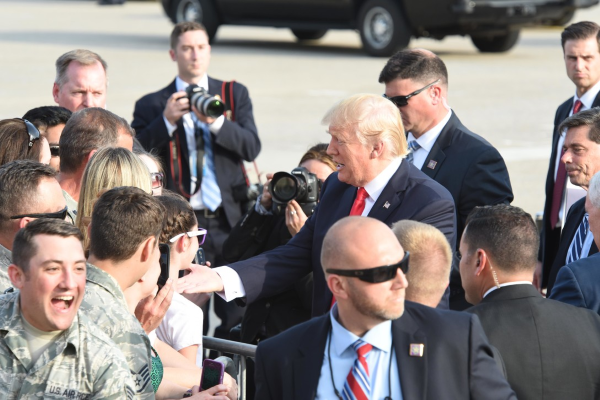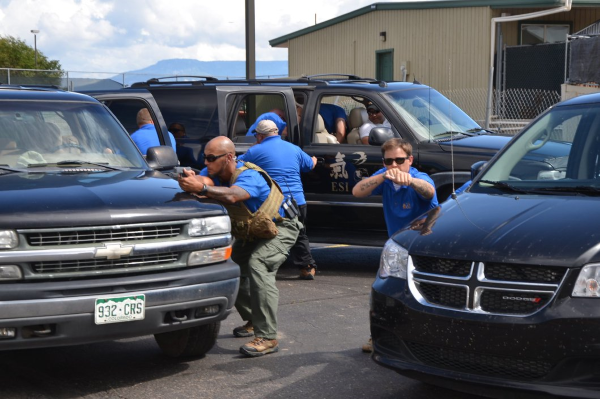High profile clients like CEOs, politicians, and celebrities have an elevated safety risk because of their employment, net worth, status, affiliations, or location.
Therefore, a type of personal security known as executive protection (EP) is designed to protect “important” people.
You can earn a high salary working personal security/executive protection for a private contractor.
However, before you get too far into the process you need to learn more about personal security and executive protection training which is highly advanced and specialized.
Related Article – The Ultimate Guide To Becoming A Private Military Contractor
Jump To A Section
What is Executive Protection?

Executive protection (EP) are security and risk mitigation measures utilized for high profile clients.
High profile clients generally produce more attention, and consequently more enemies because of their worth and status.
As a result, important people depend on personal security/executive protection for security detail.
Executive protection (EP), also known as close protection, is far more advanced and sophisticated compared to the basic security services of a bodyguard.
The term executive protection was created in the 1970s when the U.S. Secret Service created a brand of personal security to guard visiting foreign dignitaries.
The primary role of executive protection is personal security for immediate and/or extended family members of a client.
Furthermore, the complex role may include using home security systems, employing additional bodyguards, conducting background checks, organizing armored vehicles and jet travel, screening mail, and other safety measures.
Ultimately, executive protection is its own highly specialized field within the private security industry.
Related Article – Air Force Security Forces (3P0X1): Career Details
Executive Protection Training
Executive protection training is considered highly advanced and specialized.
It involves several areas of focus including:
- Firearms Training
- Advance Work
- Pre-Attack Indicator Training
- Behavioral Analysis
- Team Maneuvers
- Asset Extraction
Executive protection training also involves developing driving skills, marksmanship, and first aid.
Personal security/executive protection is regulated at the state level in the United States.
There are several states that require licensing, insurance, training, and a concealed carry permit to serve personal security detail for another client.
Consequently, there are a number of personal security/executive training schools that offer programs and licensing.
Any legitimate executive protection contractor needs to not only provide relevant training, but the licensing, registrations, and permits applicable to the job as well.
Related Article: 10 Best Jobs In The Navy For Civilian Life
Firearms Training

The issue of firearms in private sector executive protection jobs is controversial.
It doesn’t help that different states in America have various governing rules for private security and close protection teams.
While any reasonable executive protection private contractor prefers not to use his or her gun, it doesn’t mean that a dangerous situation may arise.
It is why firearms training is a major point of emphasis when it comes to executive protection training.
The best executive training programs focus on not only improving marksmanship but also examines the ethics and consequences of open fire and usually places it as a method of last resort.
The demand for hired, armed security is rising in both the United States and the rest of the world.
Perceived threats of terrorism, mass shooting incidents, and more open carry laws and practices have only contributed to the heightened demand.
Though there are clients that insist on having personal security not carry guns or local laws may govern its ability to use, firearms training is still an important part of the job.
The training involves a closer examination of the ethics and potentially lethal consequences of discharging a firearm.
Though the United States has loosened its stance on arming EP agents there is still an emphasis on proper gun use with better standards during training.
Related Article – Overseas Security Jobs
Fundamentals of Firearm Training
There are a variety of courses that promote firearms training for executive protection yet not all of them are legitimate.
You should focus on finding a program that begins with the fundamentals of firearms before progressing to live-fire drills designed to improve marksmanship.
Personal security/executive firearms training traditionally focuses primarily on handguns since they are the easiest to conceal.
Aspiring private contractors learn the unique skills necessary for concealed carry as well as the precise use of a handgun.
The course should also educate on safety, ammunition, proper operation, maintenance and storage, and shooting techniques.
Advanced training may include multiple target engagement, shooting from various positions, reacting to attacks, concealed carry proper draw and fire skills, reduced light operations, and different shooting scenarios.
Related Article – Navy Master At Arms (MA): Career Details
Advance Work

An “advance” in executive protection is a security survey of all parts of an itinerary.
For example, if a high profile client is traveling from a speech at a convention center to a hotel the security team needs to plan and coordinate the advance.
It involves careful examination of the transportation routes, vehicles, and infrastructure that exists from point A to point B.
Advance work is planned by the security team prior to the actual departure and carried out before the arrival of the high profile client.
Though most people assume that firearms training is the most important function to executive protection it is actually security advances.
The advance not only protects the client but makes sure the day goes as scheduled without any obstacles.
Good advance work training teaches new security about imagining all possible threats and protecting clientele.
Private contractors use site surveys, mapping, and route planning to coordinate travels.
The process is incredibly complex and demands high attention to detail and organization.
Related Article: 20 Best Jobs For Veterans
Points of Emphasis
Executive protection advance work training will teach you skills and strategies like:
- Pre-departure preparations
- Client biographical data and risk surveys
- Threat assessment
- Intelligence reports
- Route surveys
- Building surveys
- Setting up a 24/7 command center
- Crisis management plans
- Bomb threats and procedures
- Handling mail and packages
- Weapons of mass destruction response
- Technical countermeasures sweep
Advance work training includes preparing surveys for a variety of locations including airports, restaurants, hotels, hospitals, and other buildings.
Related Article – Top 14 Private Military Companies
Pre-Attack Indicator Training

Pre-attack indicator training for executive protection has to do with situational awareness.
Situational awareness is a very important topic in personal security.
It involves not only observation and recognizing things that seem off in your surroundings, but also interpreting what you have observed.
When you make the correct interpretation at the right moments in time you can predict potential outcomes and make careful security decisions based on your observations.
Situational awareness that is done correctly enhances safety and potentially avoids serious or catastrophic consequences.
Therefore, pre-attack indicator training involves a series of methods and strategies for reading people and their surroundings.
Executive protection agents learn about ALICE training, the 20/10 Rules, and identifying pre-attack indicators, or PAINs.
The human mind is an incredibly complex and sophisticated part of the body that EP agents attempt to master by recognizing cues that may indicate a pending attack.
Personal security private contractors learn about nonverbal cues like reading body language to make evaluations.
“Telegraphed” pre-attack indicators may include visual cues like target glancing, clenching, eye blinks, flanking, pugilistic stances, and hesitations in response.
Related Article – Air Force Signals Intelligence Analyst (1N2X1): Career Details
Behavioral Analysis

There are some similarities to behavioral analysis training and pre-attack indicators.
The two are comparative primarily because it focuses on the art of reading people and studying body language to interrupt the intentions of a stranger.
As a result, most behavioral analysis training for executive protection centers on understanding the thinking and behavior of individuals that have attacked or approached public figures in the past.
Human psychology is a very complex subject yet the best personal security/executive protection agents must master some of its strategies to become effective.
For example, an agent studying and analyzing a situation may pose the following questions about a person of interest:
- Does the behavior of the subject indicate mental health issues?
- Is the subject currently seeking to obtain a weapon or present evidence of having a fascination with weaponry?
- Is the subject exhibiting controlling, isolating, or jealous behaviors toward the target?
- Did the subject engage in any final act behaviors that indicate violence?
Aspiring EP agents are trained to act as threat mangers by understanding complex human emotions and thoughts.
When the mental health and inhibitors are analyzed of a potential suspect an EP agent can make better-informed decisions.
Successful behavioral analysis may change a potentially violent or deadly situation into a peaceful resolution without ever needing to draw a weapon.
Related Article – Army Behavioral Health Specialist (MOS 68X): Career Details
Team Maneuvers / Asset Extraction

Training for team maneuvers and asset extraction is such a detailed subject that you could dedicate an entire article to its training.
However, the gist of team maneuvers and asset extraction executive protection training is a focus on tactical strategies.
A) Team maneuvers teach recruits a variety of ways to plan, organize, and coordinate a team of varying members.
EP private contractors develop methods for working security detail and making sure a place is safe.
It can include peaceful, precautionary maneuvers (like advance work surveying) as well as maneuvers after a serious or dangerous incident.
There is also a focus on driving high-speed maneuvers and evasive driving skills for transporting clients.
B) The training also teaches private contractors about asset extraction.
Asset extraction includes the process of removing a client from a situation, dangerous or not.
Planning goes a long way in asset extraction yet, of course, there are also emergency situations where the protectee must get removed from the setting ASAP.
EP agents also develop rescue strategies like when a client is kidnapped or held hostage.
Companies Providing Executive Protection Training
There are many different places to turn to when it comes to personal security/executive protection training.
However, you need to exercise caution like with anything because not every training program is legitimate.
The best executive protection training programs focus on firearms training, advance work, pre-attack indicators, behavioral analysis, and team maneuvers/asset extraction.
Through our research, these four companies provide the best training and services for private contractors looking to get into close protection.
Executive Security International
Executive Security International (ESI) is considered one of the best major companies for training.
The company provides five-day training seminars/courses on executive protection.
The class focuses on gaining a tactical advantage while providing the client with the ultimate flexibility and freedom to carry out day-to-day activities.
It emphasizes covert blankets of preventative procedures as well as mitigating security risks while remaining completely unrecognizable.
The five-day course is available regionally and tuition costs $2,500 (not including lodging).
Longer-term residencies for executive protection training start at $8,900.
Executive Protection Institute
Executive Protection Institute (EPI) is another prominent close protection training academy.
EPI has a long-running tradition as it has developed executive protection training since its origins in the late-1970s.
It introduces the latest methods and technologies in EP training along with classic approaches like applying behavior analysis techniques.
The Executive Protection Institute is based out of New York City, and financing opportunities are available.
The Executive Protection Program charges $3,990 for tuition and additional classes average about $300.
SIG Sauer Academy
While most people will recognize the name based on the famous firearms brand, the SIG Sauer Academy isn’t quite as recognized in EP circles.
Regardless, the academy offers a high-quality executive protection training program that is much more affordable compared to ESI and EPI.
The program is designed to meet the real demand for personal security/executive protection for low to medium risk clients.
Students learn how to develop plans, routes, and site surveys.
There is also a focus on organizing motorcade operations, foot formations, and executing emergency immediate action procedures.
The course lasts five days so it is not too time-consuming and only costs $1,250.
Lasorsa & Associates
The different executive protection training programs offered by Lasorsa & Associates are also affordable.
The most comprehensive executive protection training program lasts nine days and costs $4,495.
It also includes hotel accommodations and meals.
Meanwhile, the four-day course will cover the basics and set you back only $1,495.
The other training programs include Protective Medical Response Training (Single Day), Protective Firearms/Defensive Tactics Training (2 Days), and Defensive/Evasive Driving Program (2 Days).
Related Article: – 5 Maritime Security Jobs
Conclusion
Executive protection is an important aspect of personal security in the 21st century.
The demand for private contractors to carry out executive protection is growing based on the number of high profiled clients in a more dangerous world.
You can receive very high earnings working close protection detail for high profile clients as a private contractor.
Firms often hire former military or law enforcement based on their advanced marksmanship and discipline.
Before you get started you will want to meet state-level requirements for licensing and training.
The best personal security/executive protection training programs cover the five basics/necessities of every good executive protection agent.
- Replacing Dog Tags: 6 Things You Need to Know - June 28, 2024
- Navy OAR Test Study Guide - June 24, 2024
- 10 Best Sniper Movies of all Time - June 20, 2024
